Facts Vs. Myths: Contractor and Consultant Feuds
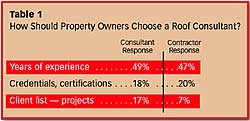
Fast forward to the present day where I'm privileged to serve in the roofing industry. For the first several years, I shared a lot of time with hundreds of people involved in professionally managed roof contracting firms. They gave me their opinions about the roles and responsibilities of roof consultants, and the dreadful pain they often cause that if not stopped, might "ruin our industry."
On the other hand, more recently, I've shared a lot of time with a few hundred of the most prominent roof consultants in North America. I've heard their take on the roles and responsibilities of professional roofing contractors. During this time, I have been told that the roofing contractor market is "overwhelmed with convicts and scam artists."
These interactions have left me with some questions. First, what insights can be learned from contractors and consultants about each other that might actually benefit our industry? Second, does the industry actually "enjoy" a relationship similar to Yankee and Red Sox fans; one where the two sides are "programmed" to say they dislike each other, but do have mutual respect and actually know they are good for each other? Or, are real feelings of mutual disgust? Third, if the basis of feelings is indeed mutual respect, how can the relationships be improved?
Fortunately, Rick Damato, editorial director of Roofing Contractor and Kristen Ammerman, publications director of the Roof Consultants Institute's RCI Interface, thought these questions were interesting too. RCI helped Roofing Contractor sponsor this study, inviting 906 consultant readers of Interface to participate (342, or 39 percent, responded). We also invited 1,500 readers of Roofing Contractor to participate (286, or 19 percent, responded). This article shares the results and analysis of the survey, as well as some points you might consider to strengthen your business and to benefit the industry.
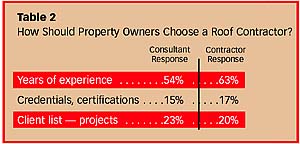
Property Owner: How to Choose a Professional?
Since contractors observe the professional consultant's work - and vice versa - it seems reasonable that an "educated buyer" might recommend buying each other's services. We asked both contractors and consultants for the most important factors in hiring roofing consultants and professional roofing contractors.
Both professions ranked "years of experience" as the most important criteria in choosing either profession. It is interesting that roofing contractors rank this attribute significantly more important (63 percent) for choosing a contractor vs. choosing a roof consultant (47 percent). See Tables 1 and 2.
For choosing a consultant, both contractors and consultants chose "credentials and certifications" as the second most important criteria (20 percent and 18 percent respectively). However, consultants ranked "client list of completed projects" as third (17 percent) while contractors also rated it third, but only with 7 percent.
For choosing a contractor, the professions were split on the second and third most important criteria. Consultants thought "client list of completed projects" was second most important (23 percent) and contractors rated this third (20 percent). Consultants ranked "credentials and certifications" third (15 percent) while contractors were 25 percent less likely to rank these criteria as important.
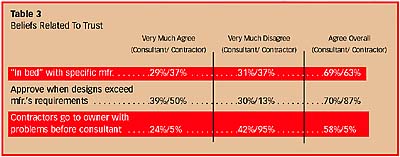
Agree to Disagree?
If you want to hear a complaint about another professional, ask if they are "in bed" with a specific manufacturer, thus implying that they are being exclusive, prices are inflated, and that the property owner is being brutalized. Interestingly, the data suggests that this belief is actually widely held by each profession about each other. Consultants have relatively strong agreement (29 percent) and 69 percent general agreement that "most contractors are ‘in bed' with a specific manufacturer" and the same is felt by contractors about consultants (37 percent strong agreement; 63 percent overall agreement.) See Table 3.
There are two significant "gaps" in perception between the contractors and roof consultants. First, roof consultants strongly disagree that contractors generally approve their specifications when they exceed manufacturers' requirements (30 percent). Contractors believe that they do approve these specifications that exceed manufacturer specifications (87 percent). Second, while only 5 percent of roofing contractors say they approach a property owner with problems prior to the consultant, 24 percent of consultants believe this to be the case.
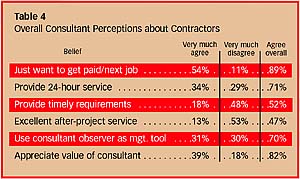
Consultants Want More from Contractors
Overall, consultants believe (89 percent) that most contractors just want to get paid and move onto the next job. While 71 percent believe contractors offer 24-hour emergency service, they appear less than satisfied (53 percent) with after-project service. See Table 4.
Thirty percent of roof consultants perceive that contractors underutilize their job-site observers. It is likely positive for the industry that 82 percent of consultants believe that in general, roofing contractors appreciate the value that roof consultants provide to projects.
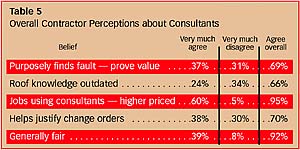
Contractors Have Mixed Feelings about Consultants
Most contractors (69 percent) believe that the typical roof consultant will purposely find fault with a roofing contractor in order to demonstrate his value to the property owner; 37 percent of contractors "very much" believe this to be true. Further, contractors (64 percent) perceive that the typical roof consultant's roof knowledge is outdated. Almost all contractors (95 percent) agree that projects using roof consultants will result in a higher price to the property owner. See Table 5.
Contractors feel positively about the roof consultant's effect on change orders. Most (70 percent) believe that roof consultants help justify change orders getting approved. Most importantly, contractors (92 percent) believe that most roof consultants are fair.
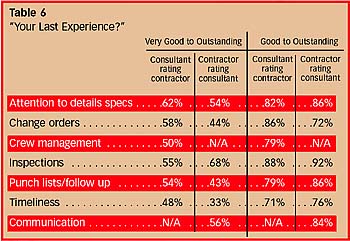
Big Picture: How Do We Really Feel?
It's one thing to ask about "typical" perceptions, but asking about "last" experience often obtains the most accurate reflections of relationships and true beliefs.The "last experience" between roof consultants and roofing contractors demonstrates that in general, relationships are OK, with room for improvement. Specifically, a quick data scan of Table 6 shows that essentially half or more of the consultants rated the contractor of their last experience as "very good to outstanding." Further, "good to outstanding" ratings are over 70 percent in all cases.
Both contractors and roof consultants are most frustrated with each other when asked about "timeliness" with only 71 percent of consultants and 76 percent of contractors satisfied with their last experience. Also, only 72 percent of contractors were satisfied with change orders in their last experience.
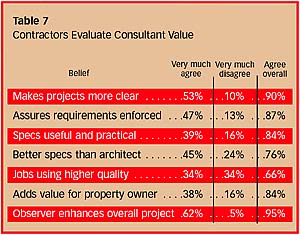
Bottom Line: Contractors Claim Consultants Add Value
Business is pretty simple. When there is significant value added, issues at the detail levels tend to work themselves out. Clearly, roofing contractors shared (in the privacy of this direct mail market research study) that roof consultants do in fact add value. The strength of this perception of worth by consultants is overwhelming in both strength of belief ("very much agree") and overall agreement. See Table 7Specifically, 90 percent of contractors believe that having a roofing consultant on the job results in the project requirements being more clearly defined. The majority of contractors (87 percent) believe that project requirements are more uniformly and consistently enforced when consultants are utilized. They believe (84 percent) that specifications provided by consultants are useful and practical. The preponderance of contractors (76 percent) claimed that design specifications from consultants are better than design specifications from architects. The majority (66 percent) judges that jobs using consultants increase the job quality. And, almost all contractors (95 percent) believe that jobs utilizing consultant observers enhance the overall project.
However, there is one judgment of contractors that is most important: 84 percent believe that "consultants add value to the project for the property owner." That's the bottom line, and it shows overall respect. It also suggests that the mutually dependent relationship between contractors and consultants must continue to evolve if we are to build an even better industry of which we can all be proud.
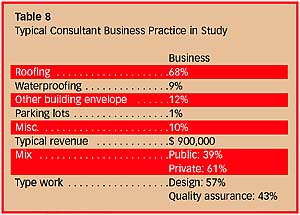
What are the Demographics?
If you believe the stereotypes, you are under the impression that most roof consulting is performed by companies with one- or two-person offices that have gross revenues of under $150,000 dollars per year. If that is your mindset, you will be surprised. This survey received a 39 percent response rate, which included 342 roofing consultants. The "typical" (median) revenues were $900,000. (See Table 8.) The range was as high as $70 million. The "average" (mean) was $4.4 million. For roofing contractors, the typical firm in this study had revenues of $1 million and 12 employees. The mean (average) was $4.1 million with 30 employees. The range was up to $300 million. See Table 9.
The technologies used in the primary workloads of the participating contractors and roofing consultants in this study are shown in Table 10.
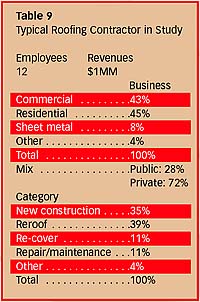
Summary Thoughts
So, what did I take away from all of this? First, this industry does "enjoy" a Boston Red Sox-New York Yankees type of rivalry between roofing contractors and consultants. There is cultural programming to spew foul generalizations of each other's effects on the industry, yet below the surface there is a mutual respect and interdependence that is likely to continue to evolve and become even more vital in future years.Why? White at the tactical level the issues seem significant, there is acceptance that overall value is generated, thus the problems are in their essence really annoyances. Classic capitalistic economics dictate that the issues will be resolved. In the big picture, as the consolidation and sophistication of property owners continues to increase, the interdependence of consulting and contracting will continue to flourish.
So what might strategic thinking, ambitious and motivated roofing contractors consider doing with the lessons learned from this study to build their business even further?
Some contractors don't think of the roof consultant as a customer. I think that's a mistake. I think of the customer as anybody that depends on you and that can influence the decision on whether you can offer your products and services in exchange for money. Does that make a roof consultant a "customer" for many roofing contractors? I think so.
The key to any business is simple: Understand your customer's pain. Share your understanding of the customer's pain. Demonstrate that you can help resolve your customer's pain.
Why not call on a few of the most influential roof consultants in your market? As we have seen, this study helps you understand the consultant's areas of pain and will help you know what ask them to demonstrate understanding and to receive clarification. This approach is much more effective than "telling" - which is the opposite of good selling. The best selling is educating, and you can't educate unless you first understand, and you can't understand unless you've first asked questions and listened.
Specifically, here are some questions to consider asking consultants, in regard to the roofing contractors that have serviced them and their clients the best in the past few years:
If you could have changed three things about their service, what would they have been?
What would you want to make sure that they didn't change, because it was service beyond what you've come to expect from many other contractors?
Have you had good experiences with after-project service and 24-hour availability?
Are you typically receiving timely progress reports and documentation you require from the contractors you've been utilizing on bids?
What have been your experiences with contractors when your specifications exceed those of manufacturers?
As the roofing consultant and potential client shares his stories, keep probing for more information with follow-up questions. Who and how does this effect people when this problem occurs? Who is yelling and screaming when this happens? Try to understand the emotions that are happening, not just the facts.
What are you likely to hear about? Timeliness and punch-list follow up.
Wherever there is frustration, ambitious entrepreneurs will differentiate their business. Wherever there are situations to differentiate, there is increased value. When there is increased value, the industry improves, profitability progresses, and everybody gains.
Looking for a reprint of this article?
From high-res PDFs to custom plaques, order your copy today!





